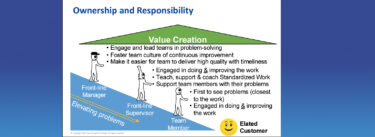Dear Gemba Coach,
Explicit leadership or implicit leadership? Does an explicit style sustain a lean organization?
Thank you for an intriguing question. To clarify the question, do we agree that explicit leadership is leadership assumed in the role, for instance, when a top manager names you in a managerial job, you’re expected to have leadership over your department (whether people in the department agree or not)? Whereas implicit leadership means the “natural” leadership people in a team will project on some of their members, recognizing them as unconscious leaders, aligning on their positions and attitudes and, well, following their lead?
I was on the gemba yesterday faced with that very question at a company where the CEO has been committed personally to lean for many years, driving the transformation in engineering and production. The sales manager has resisted all along, refusing gemba walks in his area, refusing to do any kaizen, and refusing to acknowledge any progress in engineering and production – visible progress in quality and lead-time in the way the company is perceived by clients were due to … brilliant sales actions. Great salesman; complete concrete-head.
In any case, after years of tussle with his CEO, he finally left the company and another experienced sales person was promoted into the head of sales job. Yesterday, I was present when the CEO explained that he now expected her to start conducting kaizen exercises with the sales team, as well as regular problem solving, with the aim of developing sales standards and improve teamwork with the rest of the firm.
New in the job, faced with a direct request from the CEO, she asked smart questions about the what and why and was interested in the lean thinking (which is visibly prevalent in the rest of the company) but terrified by the how: how was she going to convince a department who had historically been managed by opposition to the rest of the company and taught to dismiss all this lean BS, that now they needed to join the party? Being promoted amongst peers is a challenge enough, this was doubling down. Her new, explicit leadership role had become an implicit leadership challenge.
All the more so that the CEO had chosen her over the one guy who had great implicit leadership over the team – a charming, ambitious sales guy with very strong interpersonal skills who easily influences others but has a tendency to rely on his charisma to get what he wants without much deeper thought. As the CEO aims to rebuild a sales process and patch across function collaboration, he’d deliberately picked a more experienced, less outgoing, but essentially smarter (and maybe deeper) person to lead the team – not the obvious choice from the team’s implicit point of view. The question now is how to help her succeed?
Personal Posture
To your question: first, yes, in lean, implicit leadership is a prime consideration when picking lean leaders – particularly at team leader level which has no formal authority over the team. You look for people who are respected both for their competence and for being well liked and fair. Yet, in many cases, there is no obvious choice and some people must grow into their leadership role.
As it turns out, the lean approach also helps considerably. In fact, the character arc of the heroes of my lean novels is all about how they find their footing on implicit leadership. Phil Jenkinson at the beginning of The Gold Mine is an explicit leader as owner of the company, but a very, very reluctant leader at that, with no particular feel for implicit leadership. In The Lean Manager, he has grown into a very different leader. In Lead With Respect, he is respected by all other characters as a “great leader” without any doubts. Similarly, Andy Ward learns to become a leader to a fractious French team in The Lean Manager, and has clearly found his mark as a leader in Lead With Respect. Jane Delaney, at the beginning of Lead With Respect had been following the path the other way around. She had become CEO of her firm from her implicit leadership, but then the pressure of running the place (and a few common place misconceptions) has led her to become a bad explicit leader – and she reconnects with her teams through the book.
As the CEO of the previous company discovered for himself, the trick of turning explicit leadership into better implicit leadership is a change of personal posture: from assuming people are there to execute decisions to being interested in every person’s job, looking at their specific problems, and thinking of ways to help them make their jobs easier and more productive.
Obviously, lean activities such as standards-based problem solving and team kaizen help create the opportunities to reconnect with people, but the central idea is that we now realize that, as leaders, being named by the boss or the board is not enough. We also have to get elected by the people.
Lean thinking in no way challenges the need for explicit leadership – there is no delusion that organizations can function without formal leadership roles and without giving clear chain-of-command reference points for everyone. Explicit leaders are expected to make unilateral decisions if needed, to outline a clear vision, to be decisive on occasion. Certainly to challenge the team’s status quo.
But, lean leadership is also all about developing one’s own abilities as implicit leaders, which means going to the gemba, listening until it hurts (understanding doesn’t mean agreeing), and supporting individuals as well as being demanding. After all, one key purpose of a pull system is to establish a clear hourly schedule of work according to customer takt time, and the manager’s job is to make sure the team members have all they need to accomplish 100% of the planned schedule, hour after hour, day after day.
As I’ve tried to convey in The Gold Mine trilogy, implicit leadership in lean is developed first by leading teams in conducting kaizen firsthand (and finding what our real problems are in the process), then building the management system so that teams can conduct their own kaizen (and facing our larger challenges), and finally picking and developing the kind of leaders that will help us face our challenges by leading kaizen in the right direction (and shaping with us the future of the company). So, yes, yin-yang, explicit and implicit leadership and intricately linked in the lean approach.






